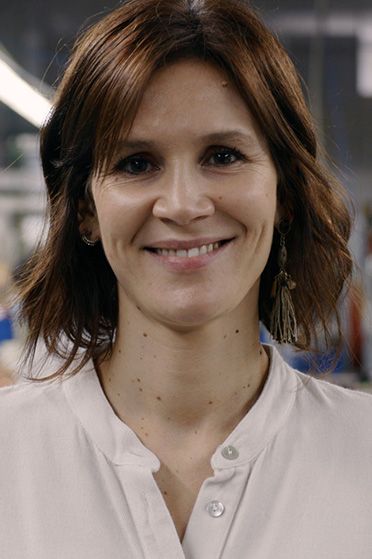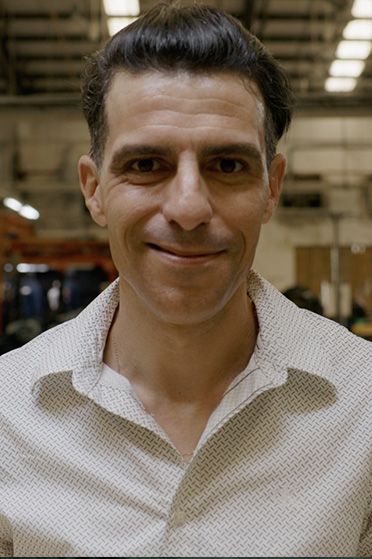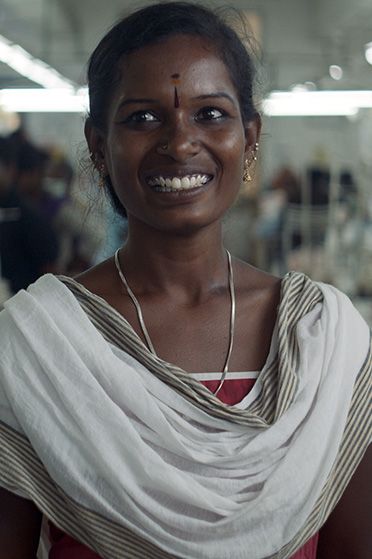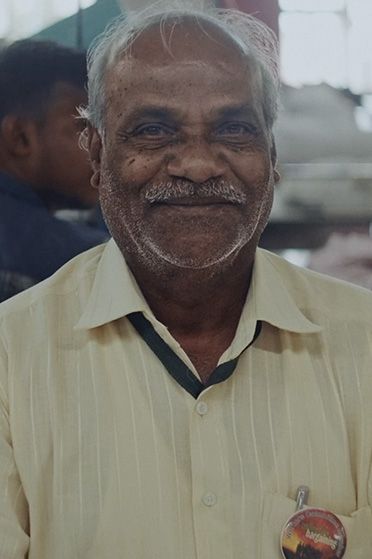Say no to Greenwashing.
Say yes to GOTS.
Say yes to GOTS.

Say yes to…
Tell me more about...
Safe and fair working conditions
Social responsibility is one of the pillars of GOTS, with a comprehensive set of requirements that address safe and fair working conditions throughout the GOTS supply chain. GOTS Certified Entities must adhere to the UN Guiding Principles and relevant ILO Conventions. The strict criteria of the Standard are comprehensive and often more demanding than comparable leading social sustainability standards. GOTS ensures that employment is freely chosen, workers are treated with respect and dignity, have safe and hygienic working conditions, and appropriate working time. Forced labour and child labour are strictly prohibited. In addition, all Certified Entities must have a social compliance management system, with defined elements in place to ensure that social criteria are met.
Dignity and respect for workers
Dignity and respect for workers are central components of GOTS social criteria. GOTS certified facilities must foster a work environment free from harassment and violence. Further, workers in GOTS facilities retain the right to join or form trade unions and collective bargaining. Migrant workers must be treated with equity, and there can be no discrimination in hiring, employment opportunities or compensation based on race, gender, ethnicity, social status, or any other aspect with the potential for bias. These rules are mandatory for every GOTS Certified Entity.
Strict requirements for the entire textile supply chain
GOTS is a holistic standard, with comprehensive and strict requirements for the entire textile supply chain. This ensures full traceability from field to finished product starting with the raw material allowed and continuing through the next stages of processing; spinning, weaving and knitting, wet-processing, manufacturing, packaging, labelling, and trading, all the way to the final distribution of organic textile products. GOTS consists solely of mandatory criteria. For the end product to carry a GOTS label, every company that is part of the process must be certified.
Organic fibres
Organic fibres, whether from plant or animal origin, are grown according to the principles of organic agriculture, sustaining the health of ecosystems, soils, and people. They are produced without the use of synthetic pesticides, herbicides, or genetically modified organisms (G.M.O.s). Fibre grown organically protects farmers and biodiversity.
Responsible use of resources
GOTS ensures the responsible and efficient use of resources. Minimising the use of water, chemicals, and energy and decreasing CO2 emissions, while increasing the use of renewable energy are the most critical actions needed in textile processing. GOTS requires that all Certified Entities collect and make available data on energy and water usage and have target goals in place to lessen consumption and reduce waste. Check out this video from our Faces from Field to Fashion series, where Mohammad shares some of the environmentally friendly measures in place at the GOTS certified wet-processing facility in Vietnam that not only preserve resources, but also protect the health of workers.
Products free of harmful chemicals
GOTS has strict criteria for the use and approval of chemicals aimed at protecting the health of workers along the supply chain, the environment, and the end consumer. To produce a final product free from harmful residue, GOTS prohibits all chemicals that don’t meet rigorous conditions, including flame retardants, PFAS and toxic dyes. Allergenic, carcinogenic or toxic chemical residues are not allowed. All chemicals used must be approved by GOTS certifiers prior to use. Workers are trained in safe handling and storage of all potentially dangerous materials, and GOTS-certified end-products are tested for hazardous substances as part of compliance.
An independent, self-financed, non-profit standard
As a self-funded non-profit organisation, all income is used to reach our vision and mission. GOTS is independent of outside economic interests. GOTS receives annual fees from each certified facility, set at only €150. GOTS applies for public funding for larger projects.
Integrity
Integrity includes traceability, transparency, and control. With a GOTS certification, traceability starts on the farm level and continues along the entire supply chain up to the finished product. Transparency is achieved through Standard criteria, labelling rules, allowed chemicals, certified entities all the way to banned companies are all public. Control is maintained through mandatory Third-Party certification for each step of the supply chain. All material entering the GOTS supply chain is documented, tested, and verified by external, accredited Certification Bodies.
What others say...
"The highest requirements for chemical management, recycling and workers' rights are met by [...] the Global Organic Textile Standard [...]"
Greenpeace
"A helpful seal with high environmental requirements is Global Organic Textile Standard (GOTS). It appeared to have the best performance in our textile seal comparison."
Stiftung Warentest
"The Global Organic Textile Standard (GOTS) is a globally accepted seal of quality for the processing of textiles made from organically produced natural fibers. GOTS is considered a best practice example and stands for the control of the entire textile chain. [...] The GOTS logo may only be applied if the entire supply and production chain is certified."
Die Umweltberatung
"When it comes to environmental criteria, the GOTS seal is a very extensive certificate that leaves little to be desired and is rarely criticised."
Utopia
Where can I find GOTS products?
The GOTS Shop-Finder is an online database of retailers worldwide that offer GOTS-certified goods. You can search by country or region, the product category you are looking for, or simply browse registered retailers.
FAQ
Greenwashing is “behaviour or activities that make people believe that a company is doing more to protect the environment than it really is” (Cambridge Dictionary, 2022).
Following increased consumer demand, many companies have incorporated so-called ‘green’ practices into their manufacturing and business models with the best intentions. But with that growth comes the opportunity to overstate or misrepresent effort and impact. ‘Sustainability’, instilled with pure motives, has become a buzzword that too often gets co-opted into exaggerated or greenwashed claims, where a company alleges itself or its products to be doing more to protect the environment than it is. With few effective regulations to date restricting what a company can claim on its label, consumers must rely on their own research to avoid getting scammed, and even the savviest shoppers can be misled.
By requiring certification throughout the entire supply chain, from seed to finished product, GOTS provides transparency and traceability, making greenwashing virtually impossible. We aim to empower people around the world who want to make truly sustainable choices to say NO to GREENWASHING and say YES to GOTS!
Check out this video of the GOTS Representative in the UK on greenwashing and how to avoid it.
Look for the GOTS logo on the product itself. GOTS labelling must be clearly visible at the time of purchase (e.g., on the packaging and/or hangtag or label). Only correct GOTS labelling guarantees that the final product is GOTS certified. If you are unsure, you can enter the licence number in the ‘free text field’ of our certified suppliers database to find out more.
Correct and complete GOTS labelling will always include:
- The trademark registered GOTS logo (or the words ‘Global Organic Textile Standard’).
- The GOTS label grade (‘organic’ or ‘made with organic’).
- Details of the certification body and a licence number
A product without this label, but with other references to GOTS, does not indicate GOTS certification. The conditions of GOTS prohibit the use of the GOTS label (or reference to GOTS certification) on the garment/final textile product, if the GOTS certification is merely valid for intermediate products/steps (such as yarn or fabric) only. It is a precondition for on-product label use that the whole value chain and the final product is certified. Claims on textile products, such as ‘this garment is made from GOTS certified cotton or yarn or fabric’, are made by the seller and are not verified or verifiable through the GOTS certification process.
GOTS is a comprehensive standard that makes a ‘full product claim’ which sets detailed environmental and social criteria for the entire textile supply chain.
By contrast, many other standards trace only the flow of fibre through the textile supply chain, allowing an organic ‘fibre claim’ in the final textile product, but without any requirements to meet environmental or social criteria.
Labels on textile products can carry generic and unverifiable organic or sustainable claims without any reference to third-party certification. These vague claims do not carry any guarantee to the consumer and can easily be greenwashing.
You can find a third-party comparison of the different standards available here.
Our vision is that organic textiles will become a significant part of everyday life, enhancing people's lives and the environment. By providing different label grades, GOTS expands the range of products which can carry the GOTS label. This helps increase our contribution to a sustainable textile industry. A product carrying the GOTS label must contain a minimum of 70% certified organic fibres, and an item with the label 'organic' contains a minimum of 95% certified organic fibres. Additionally, GOTS permits the label grade 'GOTS in-conversion'. 'Organic in-conversion' refers to the transition process from conventional to organic agricultural practices, which takes three years. Using the GOTS 'in-conversion' label grade supports farmers during that time.
Find out more about "in-conversion"
In principle, any organic textile product can be GOTS certified. Only complete/finished products can be labelled as certified with one of the two GOTS labels ('organic' or 'made with organic'). Textile fibre components of a consumer product, which is not normally classified as a textile fibre product (such as prams with textile fabrics, bassinets, car seats or furniture with textile fabric upholstery), may also be certified and labelled as a "Combined Product". It is not possible to certify and label a part or component of a product.
GOTS products are made with natural fibres from plants and animals. Plant fibres allowed include cotton, jute, coir, kapok, flax/linen, hemp and poplar cotton. Animal fibres include wool, silk, alpaca, cashmere, and mohair. All fibres must be grown organic - without the use of synthetic pesticides, herbicides, fertilizers or GMOs (Genetically Modified Organisms), in accordance with the principles of organic agriculture. GOTS lays out strict requirements for what materials may be permitted as ‘additional fibres’ for the remaining balance of the fibre composition.
Simply use the GOTS Shop-Finder to locate retailers in your region. Alternatively, you can search for “GOTS certified products” in an online search engine.
The differences between GOTS products and conventional textile products begin on the farm. Organic fibres, whether from plant or animal origin, are grown according to the principles of organic agriculture, sustaining the health of ecosystems, soils, and people. They are produced without the use of synthetic pesticides, herbicides, or genetically modified organisms (G.M.O.s).
During the processing and manufacturing stages, conventional textile factories do not have mandatory inspections, their practices can use copious amounts of toxic dyes and other chemicals, and again consume massive quantities of water and energy. Under GOTS, all certified factories are regularly inspected and verified to be following the strict rules of the Standard. That means that energy use is minimised, wastewater must be treated, and chemicals used in processing meet strict toxicity and biodegradability criteria. GOTS prohibits all chemicals that don’t meet those rigorous conditions, including flame retardants, PFAS and toxic dyes.
The stringent and mandatory requirements of GOTS result in a final product that is free from allergenic, carcinogenic and toxic chemical residues.
GOTS certified products can be found anywhere, from small boutiques to large discount chains. Smaller shops can offer a level of service and variety of options that a larger chain lacks. Discount stores can offer competitive prices because the large quantities they order result in a lower cost per unit. The price is often further lowered by the company subsidising products to attract more consumers.
GOTS believes that organic textiles should be affordable for everyone. Our vision is that organic textiles will become a significant part of everyday life, enhancing people's lives and the environment.
GOTS is a dynamic standard, fostering constant progress towards better textile processing methods while maintaining strict criteria for social responsibility. Every three years GOTS collaborates with international stakeholders and industry experts and invites public input to revise and update the Standard document. This is to account for changes in technology, developments in processing capabilities, and new chemical availability. The revision also allows the Standard to keep its ecological criteria up to date and maintain the most equitable and fair conditions for all workers in the GOTS supply chain.
GOTS elevates the entire industry to a higher level of transparency and responsibility, including successfully presenting a motion to the IFOAM OI General Assembly (the IFOAM Family of Standards is an umbrella group of trustworthy organic standards, of which GOTS is a member) advocating for inclusion of social criteria throughout the IFOAM Family of Standards.
With continuous monitoring of all players in the processing chain, GOTS has created a system of checks and balances to ensure that potential misconduct is discovered and dealt with quickly and efficiently. We take every complaint and allegation seriously and enforce penalties and sanctions if a company is not in compliance with the Standard.
A list of banned companies is available to the public on the GOTS website (see the list here).









